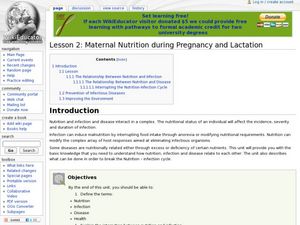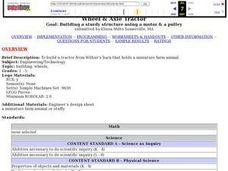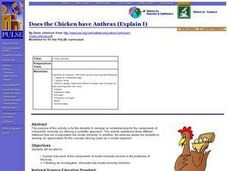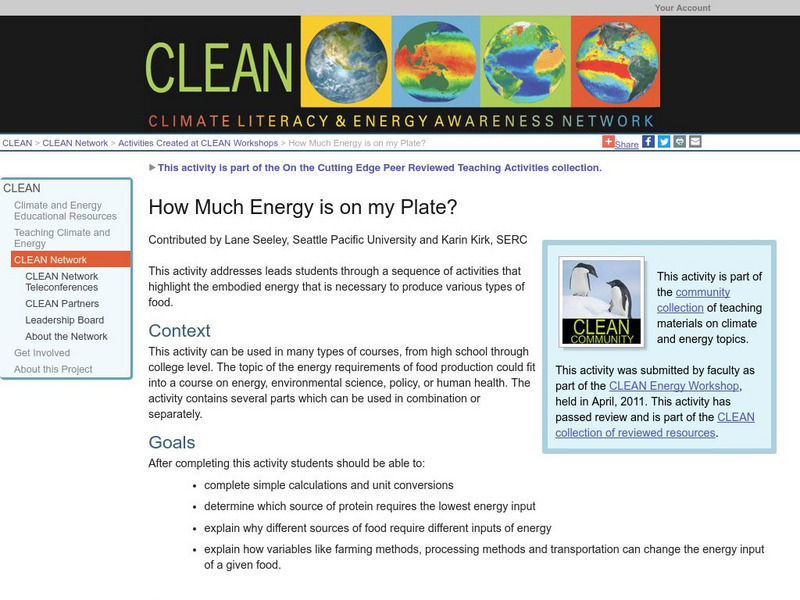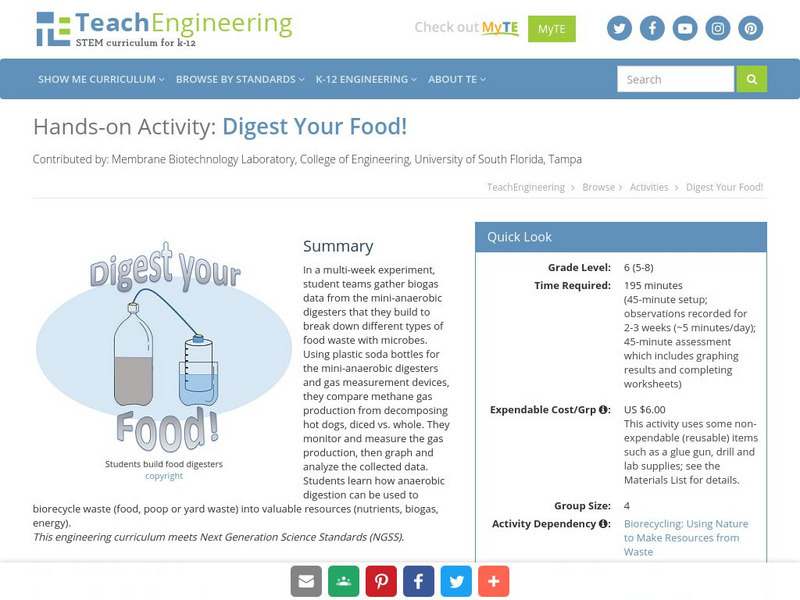Curated OER
Commonalities and Differences from Africa to Cleveland as Evidence Through the Gullah Community Connection
Students explore Afro-American history. They identify the commonality between African, Carolinian and Cleveland Black culture. Students explore the water cycle, oceanography, hydrology and bio-geochemical processes. They discuss the...
Curated OER
Maternal Nutrition during Pregnancy and Lactation
Students explain the relationship among nutrition, infection and diseases. In this health science lesson, students suggest ways to break the nutrition-infection cycle. They brainstorm solutions to prevent infectious diseases in the...
Curated OER
Forestry, What's in It for You And Me?
Learners examine the usefulness of every part of trees in a variety of activities in this unit.
Curated OER
The Future of the Arctic National Wildlife Refuge
Students research the governments role is preserving the Arctic National Wildlife Refuge. They discuss the proponents and the opponents side of the issue.
Curated OER
Nutritionist for Hire
Tenth graders role play that they are nutritionists devising a healthy dietary plan that focuses on the client's needs.
Curated OER
Wheel & Axle Tractor
Students design and build a tractor using LEGO materials. They write and draw their designs.
Curated OER
Does the Chicken have Anthrax (Explain I)
Students explain how each of the components of innate immunity function in the protection of the body. Following an investigation, they articulate how innate immunity functions.
Curated OER
Goobers. Goobers? Goobers!
Students begin the activity by noting the many ways in which to use peanuts. In groups, they use the internet to research the work of George Washington Carver. They discover the allergies and nutritional information of the peanut and...
Climate Literacy
Clean: How Much Energy Is on My Plate?
Using concept sketches, students study energy requirements of food production explain why different sources of food require different inputs of energy. They also investigate how variables like farming methods, processing methods and...
Other
Grace Communications Foundation: Energy Program
Promoting responsible energy choices and environmentally conscious government policies, NNEC provides information on energy and agriculture, the nexus of energy and water, complexities of power plants, natural gas fracking, energy...
OpenStax
Open Stax: Energy Flow Through Ecosystems
Understand how organisms acquire energy and how that energy is passed from one organism to another through food webs and their constituent food chains.
Annenberg Foundation
Annenberg Learner: The Habitable Planet: Ecosystems: Energy Flow Through
Detailed explanation of the processes by which energy flows through an ecosystem. Scroll down and open Section 3.
TeachEngineering
Teach Engineering: Digest Your Food!
In a multi-week experiment, student teams gather biogas data from the mini-anaerobic digesters that they build to break down different types of food waste with microbes. They compare methane gas production from decomposing hot dogs,...
Other
Digital Library for Earth System Education: Teaching Box: Seasonal Upwelling
A suite of lessons focusing on the process of upwelling. Inquiry-based exploration of seasonal upwelling includes marine food webs, food production in the ocean, wind-driven ocean currents, and seasonal changes in biotic and abiotic...
Geographypods
Geographypods: Patterns and Change: Patterns in Resource Consumption
This collection of three learning modules looks at issues related to resource consumption. It examines theories about how population size affects consumption, the changing patterns of energy consumption, and ways to minimize consumption....
ClassFlow
Class Flow: Healthy Eating Activity 4: Energy
[Free Registration/Login Required] This flipchart supports lessons from the 'Food - a fact of life' website. Pupils will be able to understand why their bodies need energy, how much energy is in certain food types and who needs more...
Arizona State University
Arizona State University: Why Study Photosynthesis?
Article discusses importance of Photosynthesis in terms of food, energy, and environment. Relates process to human needs.
Other
Recycle Now
All the information you need to know about recycling including different types, recycled products, degradable products, and much more. Although there are some great tips and reasons to recycle on this website for anyone in the world,...
Khan Academy
Khan Academy: Gallery: Civilization
Explore the images of this gallery and consider how increased productivity from the land, food surpluses, and swelling populations changed the types of communities that humans lived in.
Khan Academy
Khan Academy: The Citric Acid Cycle
The citric acid cycle (also known as the Krebs Cycle) is actually a part of the much larger process called cellular respiration, the process where your body harvests energy from the food you eat. Yes, the citric acid cycle has the same...
Other
Business Climate: Texas: Top Industries
This guide to Texas' top nine industries links the reader to articles and other information on each topic.
ClassFlow
Class Flow: Teeth and Eating
[Free Registration/Login Required] This flipchart discusses food groups, balanced diets, healthy teeth choices, types of teeth humans have, tooth decay and energy.
TeachEngineering
Teach Engineering: Biodomes
Students explore the biosphere's environments and ecosystems, learning along the way about the plants, animals, resources and natural cycles of our planet. Over the course of lessons 2-6, students use their growing understanding of...



